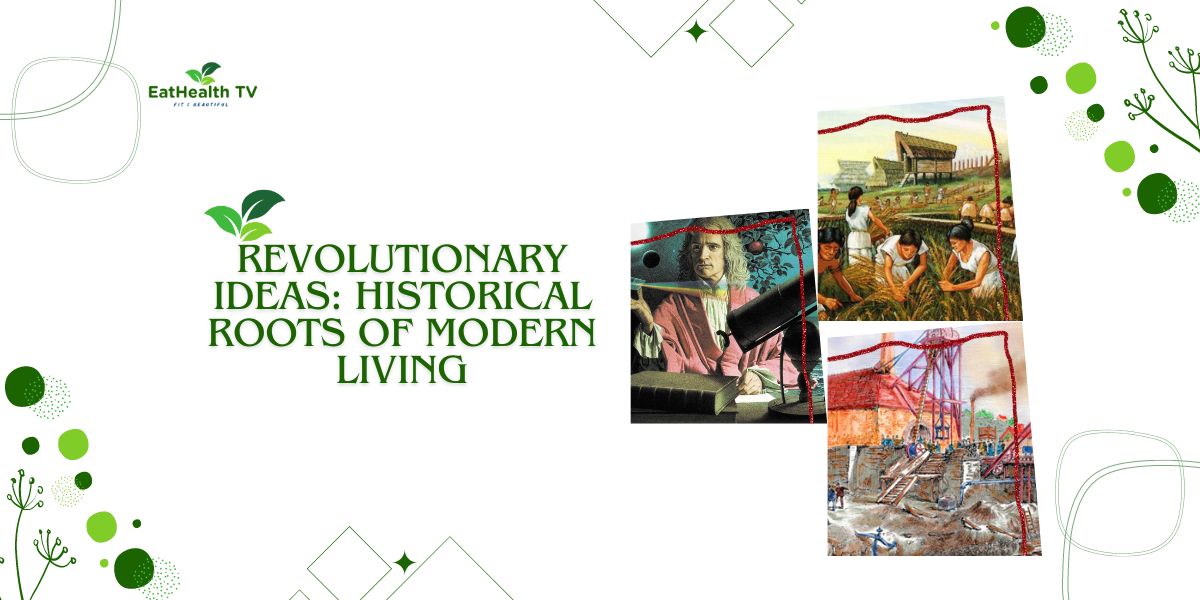Revolutionary Ideas: Historical Roots of Modern Living
Unveiling the Catalysts of Change: Exploring the Evolution of Human Innovation

Revolutionary Ideas: Tracing the Historical Roots of Modern Living
Innovation and progress have shaped human civilization for millennia, with revolutionary ideas driving advancements in technology, science, and culture. From the invention of the wheel to the development of the internet, revolutionary ideas have transformed the way we live, work, and interact with the world around us. In this comprehensive guide, we will embark on a journey through history to explore the historical roots of modern living, uncovering the revolutionary ideas and innovations that have shaped the course of human history.
The Agricultural Revolution: From Hunter-Gatherers to Settled Societies
- Transition to Agriculture: The Agricultural Revolution marked a pivotal moment in human history, as hunter-gatherer societies transitioned to settled agricultural communities. The domestication of plants and animals allowed for the cultivation of crops and the establishment of permanent settlements, leading to the rise of civilization.
- Surplus and Specialization: The advent of agriculture enabled societies to produce surplus food, which in turn led to population growth and the emergence of specialized roles and professions. With the development of farming techniques and irrigation systems, early civilizations were able to sustain larger populations and support the growth of cities and empires.
- Urbanization and Social Complexity: The shift from rural agrarian societies to urban centers brought about profound changes in social organization and cultural practices. Urbanization led to the development of complex social hierarchies, centralized governance structures, and specialized labor markets, laying the foundation for the rise of advanced civilizations. Just as we know How AI Transforms Food Production: A Tech Revolution
The Scientific Revolution: A Paradigm Shift in Human Understanding
- Copernican Revolution: The Copernican Revolution, spearheaded by astronomers such as Nicolaus Copernicus and Galileo Galilei, challenged the geocentric model of the universe and introduced the heliocentric model, placing the sun at the center of the solar system. This paradigm shift in cosmology revolutionized our understanding of the natural world and paved the way for modern astronomy and physics.
- Scientific Method: The Scientific Revolution brought about a fundamental change in the way knowledge was acquired and validated, emphasizing empirical observation, experimentation, and rational inquiry. The development of the scientific method laid the groundwork for modern science and heralded a new era of intellectual inquiry and discovery.
- Impact on Society: The Scientific Revolution had far-reaching implications for society, leading to advancements in medicine, technology, and industry. The application of scientific principles and methodologies revolutionized agriculture, transportation, and communication, transforming the way people lived and worked.
The Industrial Revolution: Transforming Society Through Innovation
- Mechanization and Automation: The Industrial Revolution was characterized by the mechanization of production processes and the widespread adoption of steam power, leading to the rise of factories and mass production. Innovations such as the spinning jenny, steam engine, and power loom revolutionized the textile industry and laid the foundation for modern industrialization.
- Urbanization and Migration: The Industrial Revolution spurred mass urbanization as rural populations migrated to cities in search of employment opportunities in factories and mills. The growth of urban centers brought about profound social and economic changes, including the emergence of a working class, labor unions, and new forms of social organization.
- Technological Advancements: The Industrial Revolution brought about rapid advancements in technology and engineering, including the development of railways, steamships, and telegraph networks. These innovations revolutionized transportation, communication, and trade, facilitating the exchange of goods and ideas on a global scale.
Conclusion: Uncover the Revolutionary Ideas that have Propelled Human Civilization
In conclusion, revolutionary ideas have been the driving force behind many of the most significant advancements in human history. From the Agricultural Revolution to the Scientific Revolution and the Industrial Revolution, transformative ideas and innovations have shaped the course of human civilization, shaping the way we live, work, and interact with the world around us. As we continue to push the boundaries of knowledge and innovation, it is essential to recognize and appreciate the historical roots of modern living, understanding how past revolutions have laid the groundwork for the world we inhabit today. By studying the revolutionary ideas of the past, we can gain valuable insights into the challenges and opportunities that lie ahead, inspiring us to continue pushing the boundaries of human knowledge and achievement.




